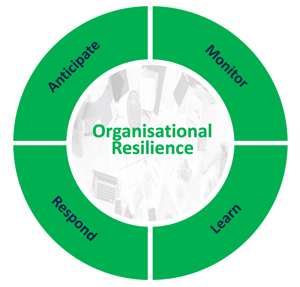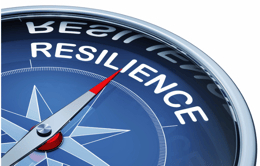 In today's fast-paced and complex world, more than traditional approaches to safety is required to manage the risks that organisations face. To truly ensure safety in the modern world, organisations need a new system that is flexible, adaptable, and resilient.
In today's fast-paced and complex world, more than traditional approaches to safety is required to manage the risks that organisations face. To truly ensure safety in the modern world, organisations need a new system that is flexible, adaptable, and resilient.
Topics: Safety Differently, Safety II
 Safety is an essential part of any workplace, and a Safety Differently approach can make all the difference in protecting employees and preventing accidents. But what exactly does this concept mean? Safety-I and Safety-II are two distinct approaches to managing risk, and both have their benefits when it comes to safeguarding the wellbeing of your staff. In this article, we'll explore how these concepts differ, discuss strategies for implementing a Safety Differently approach in the workplace, examine its potential advantages and disadvantages, and provide insights on overcoming common challenges associated with such initiatives. Join us as we take a closer look at "safety differently"!
Safety is an essential part of any workplace, and a Safety Differently approach can make all the difference in protecting employees and preventing accidents. But what exactly does this concept mean? Safety-I and Safety-II are two distinct approaches to managing risk, and both have their benefits when it comes to safeguarding the wellbeing of your staff. In this article, we'll explore how these concepts differ, discuss strategies for implementing a Safety Differently approach in the workplace, examine its potential advantages and disadvantages, and provide insights on overcoming common challenges associated with such initiatives. Join us as we take a closer look at "safety differently"!
Topics: Safety Differently
Maximising Efficiency in Safety Reporting: Identifying and Responding to Critical Risks
 Safety reporting is vital for organisations to identify and respond to critical risks. However, responding and reporting to minor and frequent incidents can be a misallocation of time and resources. In this article, we will explore ways to maximise efficiency in safety reporting by identifying and responding to the most significant safety risks.
Safety reporting is vital for organisations to identify and respond to critical risks. However, responding and reporting to minor and frequent incidents can be a misallocation of time and resources. In this article, we will explore ways to maximise efficiency in safety reporting by identifying and responding to the most significant safety risks.
Topics: Safety Differently
Shifting the Focus from Human Error to Systemic Safety: A Path to Resilience
 In high-stakes industries where safety is paramount, accidents and incidents are often quickly attributed to human error. This knee-jerk reaction to blame individuals has deep roots in organisational culture and leadership attitudes. However, this blame-oriented approach can hinder the development of truly resilient and safe systems. In this article, we will explore the limitations of focusing solely on human error, the benefits of adopting a systemic approach to safety, and how organisations can change their mindset to create robust, resilient systems.
In high-stakes industries where safety is paramount, accidents and incidents are often quickly attributed to human error. This knee-jerk reaction to blame individuals has deep roots in organisational culture and leadership attitudes. However, this blame-oriented approach can hinder the development of truly resilient and safe systems. In this article, we will explore the limitations of focusing solely on human error, the benefits of adopting a systemic approach to safety, and how organisations can change their mindset to create robust, resilient systems.
Topics: Organisational Resilience, Safety Differently, Safety II
Unlocking the Potential of Incident Investigation: Understanding Human Factors and Just Culture
 Incident investigation is a central role of safety professionals and a vital process for safety management in organisations. However, despite their importance, incident investigation processes often need to be more effective as learning tools across organisations. In this article, we will explore what an effective incident investigation process looks like, the science of human factors and the theory of just culture as they relate to incident management and investigation.
Incident investigation is a central role of safety professionals and a vital process for safety management in organisations. However, despite their importance, incident investigation processes often need to be more effective as learning tools across organisations. In this article, we will explore what an effective incident investigation process looks like, the science of human factors and the theory of just culture as they relate to incident management and investigation.
Topics: Incident and Performance Management, Safety Differently
Subscribe to News & Updates
Recent News
Categories
- Blog (195)
- Occupational Health and Wellbeing (40)
- Prosecutions (34)
- Safety Management Systems (26)
- Responsibility, Authority and Commitment (21)
- Incident and Performance Management (20)
- Planning, Objectives and Legal Obligations (18)
- Hazard and Risk Management (17)
- Reviews, Audits and Inspections (17)
- Safety Culture (15)
- Safety Differently (15)
- Safe Systems of Work (14)
- Training and Competence (13)
- Organisational Resilience (12)
- Safe Work Australia (11)
- Hazardous Materials Management (10)
- Contractors, Suppliers, Visitors & Customers (9)
- Documentation, Document Control and Records (9)
- Facilities and the Working Environment (8)
- Psychosocial Safety (8)
- Communication, Consultation and Involvement (7)
- Safety Consultants (7)
- Recently Added (5)
- Safety coaching (5)
- Workplace Culture (5)
- Safety management system software (4)
- Safety II (3)
- Authority and Commitment (2)
- Emergency Preparedness (2)
- Ergonomics (2)
- Industry Sectors (2)
- Labour Hire (2)
- Safety Leadership (2)
- Christmas (1)
- Equal Opportunity (1)
- Human Rights (1)
- Plant and Equipment (1)
- Safety In Design (1)



